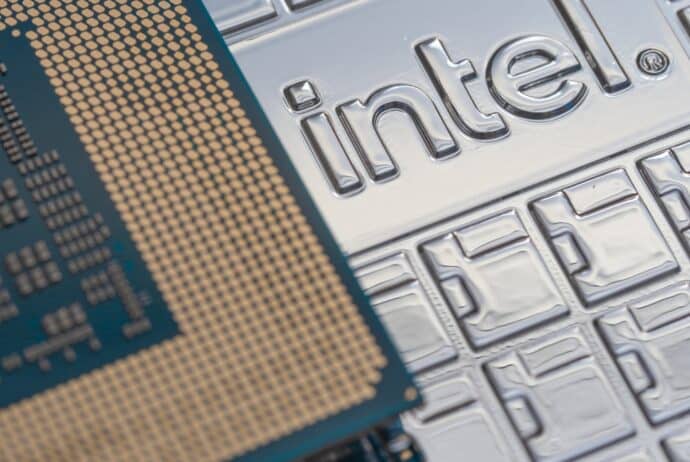Key Insights:
- Intel’s missed OpenAI investment highlights strategic missteps in the AI era, contrasting with Nvidia’s dominance and AMD’s growth.
- Despite new AI products, Intel struggles to regain its former leadership as rivals Nvidia and AMD excel in the AI chip market.
- Intel’s belief in CPUs over GPUs hindered its AI progress, while Nvidia capitalized on GPU efficiency for AI applications.
U.S. chip giant Intel, once a leader in computer technology, has faced challenges in adapting to the AI era. Around seven years ago, the company had the chance to invest in OpenAI, then a non-profit research organization focused on generative artificial intelligence.
According to sources familiar with the discussions, Intel considered acquiring a 15% stake in OpenAI for $1 billion in cash during 2017 and 2018. They also discussed the possibility of an additional 15% stake if Intel manufactured hardware for OpenAI at cost price. However, the deal did not materialize.
Intel’s then-CEO, Bob Swan, reportedly did not believe that generative AI models would become commercially viable soon enough to justify the investment. OpenAI was interested in Intel’s investment to reduce its dependence on Nvidia’s chips and to build its own infrastructure. The deal also faltered because Intel’s data center unit was unwilling to produce hardware at cost.

CypherMindHQ.com Artificial Intelligence Crypto Trading System - Surpass the competition with this cutting-edge AI system! Utilize the prowess of innovative algorithms and amplify your crypto trading strategies with CypherMindHQ. Learn more today!
Falling Behind in the AI Race
Intel’s decision not to invest in OpenAI, which has since become a major player in the AI industry with the launch of ChatGPT in 2022, remains one of several strategic missteps that have hindered the company’s progress in AI. Intel, which once set the gold standard in computer chips with its “Intel Inside” marketing slogan, is struggling to introduce a successful AI chip product to the market.
In contrast, Nvidia has surged ahead, transforming from a video game graphics company to a leader in AI chips. Nvidia’s AI chips are crucial for building and operating large generative AI systems like OpenAI’s GPT-4. Intel has also lagged behind AMD, which is now valued at $218 billion, while Intel’s market value has fallen below $100 billion for the first time in 30 years.
Intel’s AI Strategy and Product Development
Intel’s spokesperson pointed to recent comments by CEO Pat Gelsinger about the company’s AI progress. Gelsinger highlighted the upcoming launch of Intel’s third-generation Gaudi AI chip, expected to outperform competitors, and mentioned that the company had secured “20-plus” customers for its second and third-generation Gaudi chips. Intel’s next-generation Falcon Shores AI chip is scheduled for release in late 2025.
Despite these developments, Intel’s struggle in the AI domain has been long-standing. For over two decades, Intel believed that CPUs, which power desktop and laptop computers, could handle AI processing tasks more effectively than GPUs.
However, by the mid-2000s, researchers found that GPUs were more efficient for the intensive data processing required for AI models. Nvidia capitalized on this discovery, refining GPU architecture for AI applications and developing the necessary software.
Past Attempts and Future Prospects
Since 2010, Intel has made several attempts to break into the AI chip market. This includes acquiring two startups and pursuing major in-house projects. However, none of these efforts have significantly challenged Nvidia or AMD. Intel’s entire data center business, which includes AI chips, is expected to generate $13.89 billion in sales this year, compared to Nvidia’s projected $105.9 billion in data center revenue.
In 2016, Intel acquired Nervana Systems for $408 million, hoping to leverage its technology, similar to Google’s tensor processing unit (TPU) chip, designed specifically for AI. Although Nervana saw some success, Intel eventually abandoned the project.
In 2019, Intel purchased Habana Labs for $2 billion, aiming to strengthen its AI capabilities. Despite these acquisitions, Intel has yet to establish a strong presence in the AI chip market.

CypherMindHQ.com Artificial Intelligence Crypto Trading System - Outpace the competition with this high-end AI system! Leverage the capabilities of progressive algorithms and enhance your crypto trading performance with CypherMindHQ. Learn more today!
If you have a proper trading platform which is enriched with top-notch trading tools then you can secure good profits in the world of online trading. AI trading robot Finance Phantom provides traders with such kind of trading platform.
Editorial credit: Daniel Chetroni / Shutterstock.com



